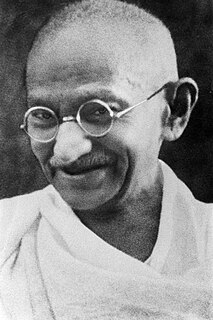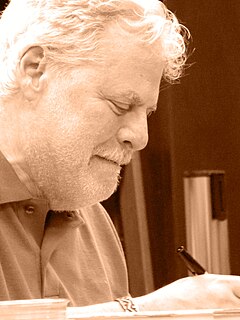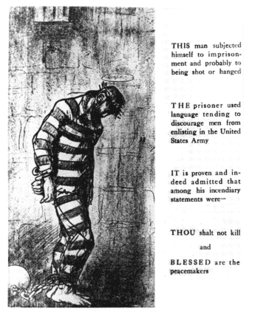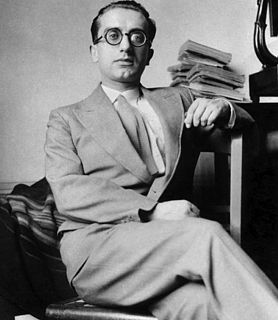
Pacifism is opposition to war, militarism or violence. The word pacifism was coined by the French peace campaigner Émile Arnaud (1864–1921) and adopted by other peace activists at the tenth Universal Peace Congress in Glasgow in 1901. A related term is ahimsa, which is a core philosophy in Indian Religions such as Hinduism, Buddhism, and Jainism. While modern connotations are recent, having been explicated since the 19th century, ancient references abound.

Satyagraha, or holding onto truth, or truth force, is a particular form of nonviolent resistance or civil resistance. Someone who practices satyagraha is a satyagrahi.

Nonviolence is the personal practice of being harmless to one's self and others under every condition. It comes from the belief that hurting people, animals and/or the environment is unnecessary to achieve an outcome and it also refers to a general philosophy of abstention from violence. This may be based on moral, religious or spiritual principles, or the reasons for it may be purely strategic or pragmatic.
Anarcho-pacifism is a school of thought within anarchism that advocates for the use of peaceful, non-violent forms of resistance in the struggle for social change. Anarcho-pacifism rejects the principle of violence, which is seen as a form of power and therefore as contradictory to key anarchist ideals such as the rejection of hierarchy and dominance. However, anarcho-pacifists do not reject the use of non-violent revolutionary action against capitalism and the state with the purpose of establishing a peaceful voluntarist society. The main early influences were the philosophies of Henry David Thoreau and Leo Tolstoy, while later the ideas of Mahatma Gandhi gained significance. Anarcho-pacifist movements primarily emerged in Russia, the Netherlands, the United Kingdom, and the United States before and during World War II.
Gene Sharp was an American political scientist. He was the founder of the Albert Einstein Institution, a non-profit organization dedicated to advancing the study of nonviolent action, and professor of political science at the University of Massachusetts Dartmouth. He was known for his extensive writings on nonviolent struggle, which have influenced numerous anti-government resistance movements around the world. Unofficial sources have claimed that Sharp was nominated for the Nobel Peace Prize in 2015, and had previously been nominated three times, in 2009, 2012 and 2013. Sharp was widely considered the favorite for the 2012 award. In 2011, he was awarded the El-Hibri Peace Education Prize. In 2012, he was a recipient of the Right Livelihood Award for "developing and articulating the core principles and strategies of nonviolent resistance and supporting their practical implementation in conflict areas around the world", as well as the Distinguished Lifetime Democracy Award.

Peace churches are Christian churches, groups or communities advocating Christian pacifism or Biblical nonresistance. The term historic peace churches refers specifically only to three church groups among pacifist churches—Church of the Brethren; Religious Society of Friends (Quakers); and Mennonites, including the Amish, Old Order Mennonite, and Conservative Mennonites—and has been used since the first conference of the peace churches in Kansas in 1935.

Mark Kurlansky is an American journalist and writer of general interest non-fiction. He has written a number of books of fiction and non-fiction. His 1997 book, Cod: A Biography of the Fish That Changed the World (1997), was an international bestseller and was translated into more than 15 languages. His book Nonviolence: Twenty-five Lessons From the History of a Dangerous Idea (2006) was the non-fiction winner of the 2007 Dayton Literary Peace Prize.
The International Fellowship of Reconciliation (IFOR) is a non-governmental organization founded in 1914 in response to the horrors of war in Europe. Today IFOR counts 71 branches, groups and affiliates in 48 countries on all continents. IFOR members promote nonviolence, human rights and reconciliation through public education efforts, training programs and campaigns. The IFOR International Secretariat in Utrecht, Netherlands facilitates communication among IFOR members, links branches to capacity building resources, provides training in gender-sensitive nonviolence through the Women Peacemakers Program, and helps coordinate international campaigns, delegations and urgent actions. IFOR has ECOSOC status at the United Nations.

Christian pacifism is the theological and ethical position that any form of violence is incompatible with the Christian faith. Christian pacifists state that Jesus himself was a pacifist who taught and practiced pacifism and that his followers must do likewise. Notable Christian pacifists include Martin Luther King, Jr., Leo Tolstoy, and Ammon Hennacy. Hennacy believed that adherence to Christianity required not just pacifism but, because governments inevitably threatened or used force to resolve conflicts, anarchism. However, most Christian pacifists, including the peace churches, Christian Peacemaker Teams and individuals such as John Howard Yoder, make no claim to be anarchists.
Civil resistance is political action that relies on the use of nonviolent resistance by civil groups to challenge a particular power, force, policy or regime. Civil resistance operates through appeals to the adversary, pressure and coercion: it can involve systematic attempts to undermine the adversary's sources of power, both domestic and international. Forms of action have included demonstrations, vigils and petitions; strikes, go-slows, boycotts and emigration movements; and sit-ins, occupations, and the creation of parallel institutions of government. Civil resistance movements' motivations for avoiding violence are generally related to context, including a society's values and its experience of war and violence, rather than to any absolute ethical principle. Cases of civil resistance can be found throughout history and in many modern struggles, against both tyrannical rulers and democratically elected governments. The phenomenon of civil resistance is often associated with the advancement of democracy.

Nonviolent resistance is the practice of achieving goals such as social change through symbolic protests, civil disobedience, economic or political noncooperation, satyagraha, or other methods, while being nonviolent.

Nonkilling, popularised as a concept in the 2002 book Nonkilling Global Political Science, by Glenn D. Paige, refers to the absence of killing, threats to kill, and conditions conducive to killing in human society. Even though the use of the term in academia refers mostly to the killing of human beings, it is sometimes extended to include the killing of animals and other forms of life. This is also the case for the traditional use of the term "nonkilling" as part of Buddhist ethics, as expressed in the first precept of the Pancasila, and in similar terms throughout world spiritual traditions. Significantly, "nonkilling" was used in the "Charter for a World without Violence" approved by the 8th World Summit of Nobel Peace Laureates.
The Unconquerable World: Power, Nonviolence, and The Will of the People is a book on the power of nonviolence by Jonathan Schell published in 2003.
Different Muslim movements through history had linked pacifism with Muslim theology. However, warfare has been an integral part of Islamic history both for the defense and the spread of the faith since the time of Muhammad.
Michael N. Nagler is an American academic, nonviolence educator, mentor, meditator, and peace activist.

Aldo Capitini was an Italian philosopher, poet, political activist, anti-Fascist and educator. He was one of the first Italians to take up and develop Mahatma Gandhi's theories of nonviolence and was known as "the Italian Gandhi".

The Politics of Nonviolent Action is a three-volume political science book by Gene Sharp, originally published in the United States in 1973. Sharp is one of the most influential theoreticians of nonviolent action, and his publications have been influential in struggles around the world. This book contains his foundational analyses of the nature of political power, and of the methods and dynamics of nonviolent action. It represents a "thorough revision and rewriting" of the author's 1968 doctoral thesis at Oxford University. The book has been reviewed in professional journals and newspapers, and is mentioned on many contemporary websites. It has been fully translated into Italian and partially translated into several other languages.

Ali Abu Awwad is a prominent Palestinian peace activist and proponent of nonviolence. He is the founder of Taghyeer (Change), a Palestinian national movement promoting nonviolence to achieve and guarantee a nonviolent solution to the conflict. Awwad’s story and efforts have been featured in over twelve documentaries including two award-winning films, Encounter Point and Forbidden Childhood. Furthermore, he was honored by the global nonprofit thinktank Synergos as the Arab World Social Innovator in Palestine for "introducing non-violence, reconciliation, and civic participation to Palestinians as a means of empowering citizens to seek social change and find a more equitable solution to conflict." Awwad is currently finishing his memoir called Painful Hope, an account of his experiences as well as his strategy and vision for the Palestinian future. He lives in Beit Ummar, near Hebron.

Direct action originated as a political activist term for economic and political acts in which the actors use their power to directly reach certain goals of interest; in contrast to those actions that appeal to others ; by, for example, revealing an existing problem, using physical violence, highlighting an alternative, or demonstrating a possible solution.

Diversity of tactics is a phenomenon wherein a social movement makes periodic use of force for disruptive or defensive purposes, stepping beyond the limits of nonviolence, but also stopping short of total militarization. It also refers to the theory which asserts this to be the most effective strategy of civil disobedience for social change. Diversity of tactics may promote nonviolent tactics, or armed resistance, or a range of methods in between, depending on the level of repression the political movement is facing. It sometimes claims to advocate for "forms of resistance that maximize respect for life".












